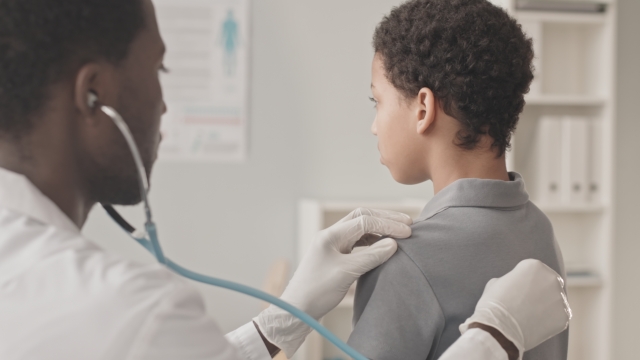The journey to Dr. P.J. Parmar's office was not easy or short for many who sit in his waiting room.
"We get a lot of people with chronic pains. They hold their health in their body — back pain, chest pain, headaches and so forth," Parmar said. "They come from war zones and places where they were at, there was an oppressing population. So, they come here and they're always on guard and we have to sort that out here as far as what's physical and what's mental."
Many of the people he cares for are immigrants and refugees. His private practice, just outside Denver, is called The Mango House.
"Mangoes are from a lot of places in the world that our patients come from," Parmar said of the name.
He will care for those who are uninsured, like someone who is undocumented, at no cost. He also accepts patients on Medicaid, which not all doctors do, since it typically pays less per visit than private insurance. He says many of his Medicaid patients have jobs and private insurance, but deductibles and co-pays often make care too expensive.
Rostam Shinwari is one of Parmar's patients. He, his wife and five children escaped Afghanistan in 2021 after the U.S. withdrawal.
Like tens of millions of people in the coming months, the Shinwaris will be evaluated to see if they still qualify for Medicaid post-Public Health Emergency.
"They have a family of seven with one working parent who, unfortunately, is not working at a great job. They're probably not going to be at risk of losing Medicaid," Parmar said of the Shinwaris after their visit.
SEE MORE: What will change when the COVID-19 public health emergency expires?
In Colorado, a family of seven would have to make more than roughly $60,000 a year to no longer qualify, according to the calculator on Benefits.gov. The amounts vary from state to state.
"The biggest factor is somebody's income changes and it puts them beyond the threshold for Medicaid," said Adam Fox.
Fox is the deputy director for the non-partisan Colorado Consumer Health Initiative.
He says changes in how much money a family made during the pandemic will be a big reason many lose coverage as states evaluate who still qualifies.
While Colorado is just beginning to go through its rolls, a handful of states started the process as soon as Congress would let them on April 1, like Arkansas.
The state posted the results of its unwinding of the Public Health Emergency exceptions for Medicaid through one month.
More than 72,000 people were removed from the Arkansas Medicaid program.
While 5,414 people were removed because their income exceeded the limit for their household, more than half — 44,714 — were removed for issues like not turning in their paperwork.
Some states are moving faster than others when it comes to evaluating who still qualifies for Medicaid.
Colorado says the process will take about a year, while Arkansas is expecting to finish the process in half that time.
Fox says he worries about whether re-enrollment packets, which several states are sending through the U.S. mail, will get to those who need them.
"Which presents some challenges, like if somebody has moved or address has changed for one reason or another, they're not receiving that notification," Fox said.
He says many people who lose coverage will qualify for special tax credits to make Affordable Care Act plans more cost-friendly.
SEE MORE: How to shop for new insurance if you lose Medicaid coverage
Another state that already started evaluating who qualifies for Medicaid in April was West Virginia.
Kathie Brown leads a free health clinic, Wheeling Health Right.
She says in March, she treated roughly 1,200 people, but in April, as people started to lose their Medicaid coverage, she treated roughly 1,500. And 300 more patients means an increased cost to operate her clinic.
"Our numbers are already up. We've already finished one month," she said. "Now, we have to figure out how we're going to provide the labs, the x-rays, the surgeries, whatever they might need because they may no longer have access to their medical card."
Parmar isn't worried about his ability to provide care, even if it has to be free. He does worry, though, about where his patients will go for specialty issues when they need care beyond what he can offer as a family doctor.
"When we can't figure it out, we refer out to specialists. And even if I'm willing to take Medicaid and see some people even for free, the specialists may not be," Parmar said.
He says many issues that might need surgery can often go untreated. And as an emergency order may be ending, issues he sees for those new to this country when it comes to health care are far from over.
"Where they came from, whether that is war zones or the journey to get here — that's one thing — but as soon as they get here, the second phase of their life starts and it can be as traumatic as the first," Parmar said.
Trending stories at Scrippsnews.com





